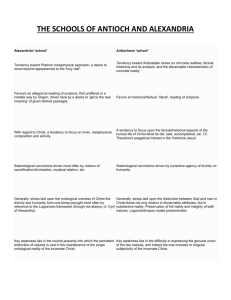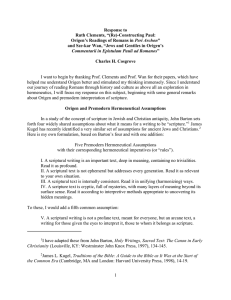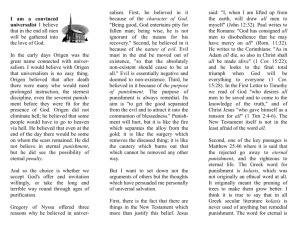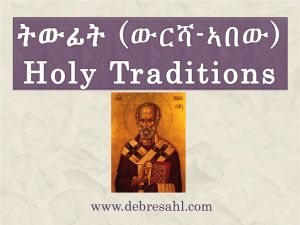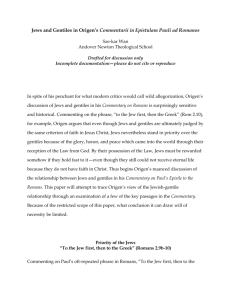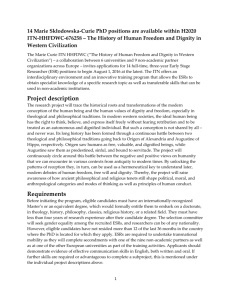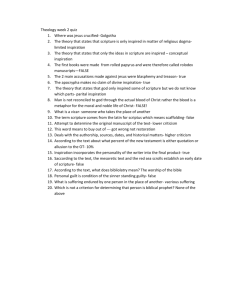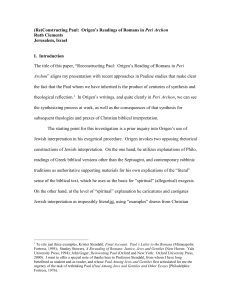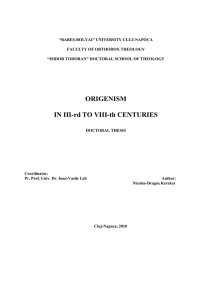Peter Gorday - Vanderbilt University
advertisement
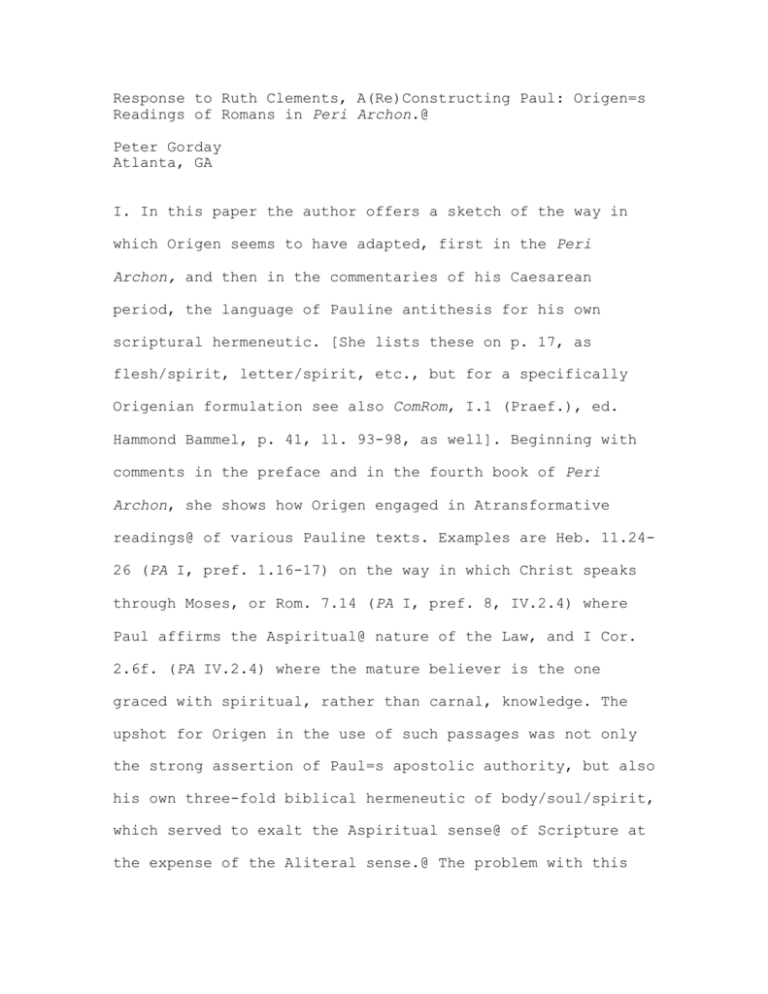
Response to Ruth Clements, A(Re)Constructing Paul: Origen=s Readings of Romans in Peri Archon.@ Peter Gorday Atlanta, GA I. In this paper the author offers a sketch of the way in which Origen seems to have adapted, first in the Peri Archon, and then in the commentaries of his Caesarean period, the language of Pauline antithesis for his own scriptural hermeneutic. [She lists these on p. 17, as flesh/spirit, letter/spirit, etc., but for a specifically Origenian formulation see also ComRom, I.1 (Praef.), ed. Hammond Bammel, p. 41, ll. 93-98, as well]. Beginning with comments in the preface and in the fourth book of Peri Archon, she shows how Origen engaged in Atransformative readings@ of various Pauline texts. Examples are Heb. 11.2426 (PA I, pref. 1.16-17) on the way in which Christ speaks through Moses, or Rom. 7.14 (PA I, pref. 8, IV.2.4) where Paul affirms the Aspiritual@ nature of the Law, and I Cor. 2.6f. (PA IV.2.4) where the mature believer is the one graced with spiritual, rather than carnal, knowledge. The upshot for Origen in the use of such passages was not only the strong assertion of Paul=s apostolic authority, but also his own three-fold biblical hermeneutic of body/soul/spirit, which served to exalt the Aspiritual sense@ of Scripture at the expense of the Aliteral sense.@ The problem with this literal sense, typical of Jews, heretics, and many wellintentioned, but ignorant (Asimple@) believers, was, for Origen, in its obtuseness to the central dogmas of God and Christ and the Church. A critical element thus in Origen=s appropriation of Paul was the use of texts which could be seen to imply a disparagement of this Aliteral@ sense of Scripture, numerous passages such as Rom. 2.28-29 (Atrue Jew@ and Afalse Jew@), Rom. 9.6. (Israel Aaccording to the flesh,@ and AIsrael according to the spirit@), Gal. 4.26 (the earthly Jerusalem and the Jerusalem above), etc., serving the purpose nicely. Ultimately, argues Ruth Clements, Origen settled on I Cor. 10.18 and the contrast of AIsrael according to the flesh@ and AIsrael according to the spirit@ as his Ahermeneutical key@ and the Aunique exegetical move@ of his project. In so doing, he disinherited, with great and clear decisiveness, the Jews as readers of the Scriptures. Indeed, the thrust of the author=s argument is the claim that Origen accomplished this disinheritance of Jewish interpretation by means of a conscious rhetorical strategy. With his artful use of Paul he was able both to appropriate Jewish exegesis of Scripture in order to refute competing Gnostic interpretations, but also to depreciate that same Jewish exegesis finally as Aliteral@ and thus unworthy of the higher spiritual reading. This strategy, begun in Peri Archon and continued in the Commentary on John, then reemerged in the commentaries of the Caesarean period, where Origen showed signs of contact with contemporary Jews. The hallmark of the strategy repeatedly was to engage in a polemic against Jewish literalism, which is then a foil for mounting a simultaneous strike against heretics or lukewarm believers, who can be accused of being AJews.@ Thus, a Adual rhetorical function@ served for Origen a Asingle hermeneutical aim,@ that of rescuing Hebrew Scripture from heretics, as well as from contemporary Rabbinic interpreters, by exposing through the contrast of fleshly Israel and spiritual Israel the errors contained in literal readings of Scripture. Origen had thereby established a powerful way of reading Scripture, a way which served purposes both of internal social control, as well as of external defense B just the tool, in short, for centuries of ecclesiastical tyranny! II. Now, what seems to me most true and most helpful in Ruth Clements= argument is its sense for the way Origen=s hermeneutic of Scripture consistently, and with discernible continuity, shapes his entire work. There is the implication at least that its influence on later Christian interpretation has been massive (witness Henri de Lubac=s work). Origen truly stands in the middle of the headwaters of the Aspiritual@ interpretation of Scripture and the countless debates, for better or worse, engendered by the concept. Equally compelling is her awareness that Origen=s hermeneutical theorizing and application somehow grows out of, even as it seriously modifies, Paul=s own theological agony about how to read scripture. Origen=s hermeneutics, however esteemed, are certainly an attempt to be faithful to Paul and his convoluted reflection about AIsrael.@ Reading Israel in Romans, and throughout Paul=s letters, seems to have been just as important and pressing for Origen as it is, for quite different reasons, for modern interpreters. Ruth Clements makes, as well, an original contribution, it seems to me, with her development of Origen=s polemical context and his consequent rhetorical strategizing to meet the demands of that context. His use of various terms to disparage and dismiss adversaries is vivid, rich, and pointed, often cutting in multiple directions simultaneously. She is absolutely right in contending that he Adisinherits,@ and I might say Adis-entitles,@ his opposition. There is no question but that he was engaged, as were all parties at the time, in a battle for control of the interpretation of Scripture. This is the period of the creation of Scriptural canons for both Christian and Jewish communities, with the entailed process, as well, of establishing norms of interpretation. Intricately involved, in addition, were the disputes about orthodoxy shaking both the Christian and Jewish communities. A great many polemical things were said in the heat of conflict (and domestic conflict is the worst), with denunciations hurled in all directions. A great deal of smoke was generated by these forest fires, and the modern historian must not be misled by its thickness into taking everything at face value. The author is also quite right, nonetheless, in (what I think is) her determination to hold Origen accountable for what is at times his massive and contemptuous dismissal of Jewish interpretation and practice. She gathers abundant testimony to this side of Origen=s expression, though, in the process, she then chooses to downplay the possibility that at other times, and on certain levels, Origen operated in the posture of authentic (not feigned!) gratitude to Jewish wisdom precisely as Jewish. She somewhat saves Paul himself from an anti-Jewish indictment by suggesting that Origen=s picture of the Apostle is purely and simply part of a patristic construct, but she does not acknowledge that Origen=s struggle with the Aletter@ is also in part Paul=s as well, as I believe it was. In fact, both Paul and Origen stood in a deep stream of literary and theological development that swirled around issues of the truth-status and correct interpretation of Aclassic@ texts. Origen=s hermeneutic is not a piece of anti-Jewish argument in unambiguously simple terms, but rather was part-and-parcel of the widespread grappling for typological models of scriptural interpretation, so that authoritative texts would Alive@ for present, and everchanging, contexts. An arch-figure in the Jewish portion of this history is Philo of Alexandria B an obvious influence acknowledged by Clements, but quickly minimized. Origen was in this regard preceded in the Christian orbit by Irenaeus of Lyons, as well as a series of Gnostic and Jewish-Gnostic interpreters, and then paralleled later by the Antiochene interpreters, beginning with Diodore of Tarsus, who were in their own way just as committed to symbolic exegesis. What we can see is that the development of these symbolic and allegorical types of interpretation was not just an effort to dismiss and disinherit, but also a means of Amaking meaning@ in the light of current experience. Here the Rabbis were just as inclined to engage in typology and scholastic extenuation of texts as anyone else. It is important to see that at the same time Origen dismissed Jewish interpretations as Aliteral,@ he borrowed from them, and, even more, engaged in forms of interpretation shared by all, even if they came to different conclusions. I believe that he in fact recognized elements of kinship here, and thus was quick to acknowledge shared horizons between AMoses@ and AChrist,@ particularly at the level of ethical interpretation, when circumstances warranted (as in the Contra Celsum). In an even larger perspective, moreover, there is the question of Origen=s Platonism (and some would say of his Gnosticism as well). These obviously are major players in any assessment of his view of the status of the Aliteral sense@ of Scripture. I have argued elsewhere that in fact, and within the parameters of Platonism, he has profound respect for the Aliteral sense.@ At the risk of great oversimplification, he was constantly faced with the problem of dealing with the fact that Ahigher@ levels of reality can be experienced only in, through, and by means of concrete embodiments. All of his manifest conflict with Valentinian Gnosticism makes sense only in terms, as Clements acknowledges, of his determination to uphold free will, but the essential import of embodied existence with its moral drama is thereby necessarily included as well. A major portion of Origen=s use of Paul in Romans, as this appears in Peri Archon, is in III.1, with its elaborate exposition of the theme of God=s hardening of Pharoah=s heart. Drawn both from Exodus and Romans, the theme allowed Origen to argue his case for the nature of divine pronoia and paideusis both in generating the terms of moral evil and in holding humans accountable for it. God=s punishing of Pharoah stands, thought Origen, as a kind of window into the mysterious working of divine grace as it interacts with human freedom. But, this is tantamount to saying that the drama of the soul and its transformation is central to Origen=s hermeneutic. Thus, as his Platonism suggests, and as his actual exegetical practice testifies, with its ever present concern for the moral import of Scripture, Origen seems to have focused not on dogmas for their own sake, but for their moral value (in the sense of the building up of the soul). Here he learned constantly from the Rabbis (his use of the wisdom literature is omnipresent), even as he attempted to wrest Scripture away from them. Technically, thus, it may be correct to say, as Clements does, that the literal sense represents literalism and the Amuffling@ of the Logos in the text, but it is equally correct to say that we embodied readers, ever morally challenged, can hear the Logos in no other way. I suspect that we cannot ourselves read Israel in Paul, or in Origen, apart from our current context. Today, everything is sharply, very sharply, polarized, as daily reports remind us, and a deeply anti-Jewish Origen makes sense. Some years ago, however, and from Jerusalem University, a Jewish scholar, Ephraim Urbach, argued that Origen, in his allegorical interpretation of the Song of Songs in terms of the journey of the soul toward God, had learned deeply from the Caesarean Rabbis [Script. Hieros. 22, (1971), 247-275]. The mood was more irenic, more conciliatory, when Urbach wrote, and an ecumenical, more inward, spirit reigned. Hopefully, those times will return, with added justice, and with the advantage of all that we have learned in the meantime from interpreters of Origen like Ruth Clements.
